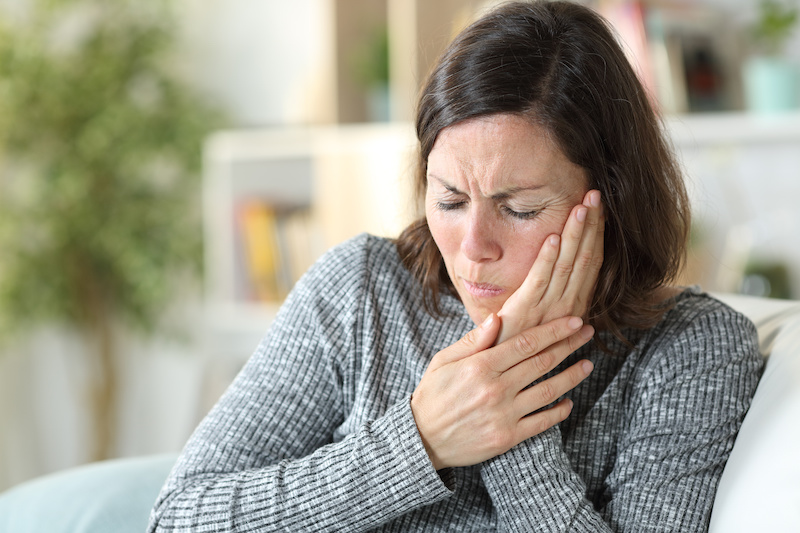
💡 Key Takeaways
- Understanding TMJ and Its Impact: Temporomandibular joint (TMJ) disorders primarily affect the jaw, causing pain, tightness, and sometimes even migraines. TMJ can also impact sleep quality due to its role in facilitating the airway, leading to potential breathing issues during sleep.
- TMJ and Sleep Apnea Connection: While TMJ disorders and sleep apnea are distinct conditions, they can be interconnected. Sleep apnea involves breathing interruptions during sleep, and TMJ can exacerbate these symptoms. The body’s attempt to correct airway obstructions can lead to TMJ symptoms like jaw clicking during sleep.
- Sleep Apnea’s Influence on TMJ: Sleep apnea can worsen TMJ disorders. When the brain detects low oxygen levels, it signals the jaw muscles to contract in an attempt to stabilize the airway. Repeated clenching can lead to TMJ and nighttime bruxism, causing wear on teeth and joints.
- Treatment Approaches: Addressing both TMJ and sleep apnea simultaneously can lead to better sleep. CPAP machines are effective for sleep apnea, ensuring the airway remains open. For TMJ, treatments range from anti-inflammatory medications, corticosteroid injections, mouthguards, oral devices, to even surgery in extreme cases.
- Seeking Comprehensive Solutions: Both TMJ and sleep apnea can disrupt quality sleep. If experienced together, it’s crucial to treat both conditions to ensure restful sleep and overall well-being.
Getting your recommended hours of sleep and enough quality sleep are both important factors for living a healthy life.
However, if you are living with a temporomandibular joint (TMJ), achieving comfortable and refreshing sleep may feel daunting. Adding sleep apnea to the mix, a complex problem can arise. Having both TMJ and sleep apnea can lead to experiencing physical barriers that prevent restorative sleep.
While the two are far from alike, keep reading to learn the connection between TMJ and sleep apnea.
How TMJ Affects Sleep Quality
The temporomandibular joint is important for the jaw movement you need for speaking and eating. A lesser-known thing you may not immediately think about is its importance in facilitating the airway. If you have TMJ, you may notice the problem with having a proper airway starts during sleep.
The main symptom those with TMJ experience are tight, sore facial muscles that ultimately cause pain. There may also be popping or clicking noises present. Grinding and clenching of the teeth throughout the day and during sleep are common habits that only make things worse.
The chronic stress you put on the muscles may start at the jaw, but the pain can spread to other areas on the face, neck, and shoulders. This makes sleeping comfortably throughout the night hard. Those with TMJ can also deal with constant migraines and headaches that make the chances of getting good sleep difficult.
The Connection Between TMJ and Sleep Apnea
TMJ disorders and sleep apnea are two very separate conditions. When you have sleep apnea, you will experience breathing issues throughout the night as your airway gets blocked.
If sleep apnea continues on a long-term basis without treatment, it can cause a range of complications such as high blood pressure, reflux, increased cortisol levels, digestive issues, and even death.
TMJ disorders are mainly a problem connected with the joint and often cause pain. Oftentimes doctors will treat the two separately.
Can Sleep Apnea Cause TMJ?
Having sleep apnea can contribute to TMJ disorders by making the symptoms worse. Anytime the brain notices a drop in oxygen levels, it will talk to various systems in the body. For example, it will tell the heart it needs to increase its heart rate to deliver more oxygen.
As a result, the brain will attempt to open up the airway by telling the jaw muscles to contract. The clenching motion is meant to help stabilize the airway. However, repeated clenching is an issue that can lead to TMJ. It can cause nighttime bruxism and later result in wear and tear on your teeth and joints.
Does TMJ Cause Sleep Apnea?
With TMJ, the airway can collapse in a similar way as it would with Obstructive Sleep Apnea (OSA). The body attempts to correct this by pushing the lower jaw forward to open the airway. This will cause you to experience issues like jaw clicking while sleeping. The ever-constant movement of the TMJ causes stress and tension.
Think You May Have Sleep Apnea? Take Our FREE Sleep Apnea Quiz!
Treating TMJ and Sleep Apnea for Restful Sleep
For some people, TMJ can be resolved on its own. However, this is not the case for everyone. If you are experiencing both TMJ and sleep apnea and want to get better sleep, you want to address both problems simultaneously.
For sleep apnea, opening and maintaining your airway is key. When you have sleep apnea, you momentarily stop breathing, which can happen several times throughout the night. CPAP machines increase air pressure in the throat to prevent your airway from collapsing.
To treat TMJ, your doctor may prescribe an anti-inflammatory medication or may also suggest corticosteroid injections to help with the pain. Physicians may recommend these options with the use of mouthguards or oral devices.
It helps to regularly engage in oral stretching exercises and massages at home to ease tense muscles, which can reduce grinding and clenching. Other alternatives include botox injections to relax the muscles. Surgery to treat TMJ is a last resort like with sleep apnea and is only suggested in extreme cases.
Get the Right Solutions for TMJ and Sleep Apnea
TMJ and sleep apnea are separate disorders but can both cause a disruption to productive sleep. If you are experiencing both in connection with one another, then treating the two together will help get you on your way to a better night of sleep and a more productive day.





